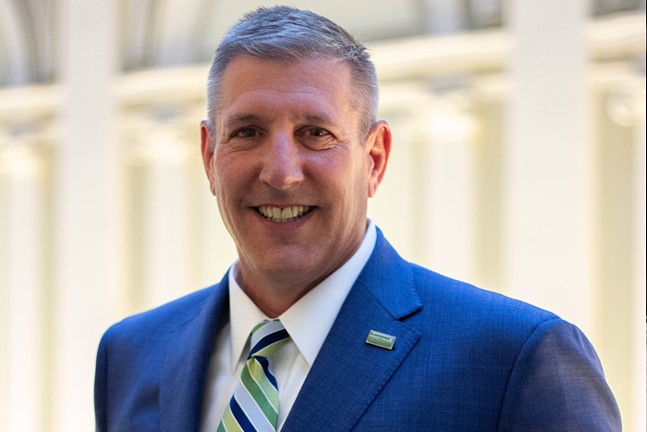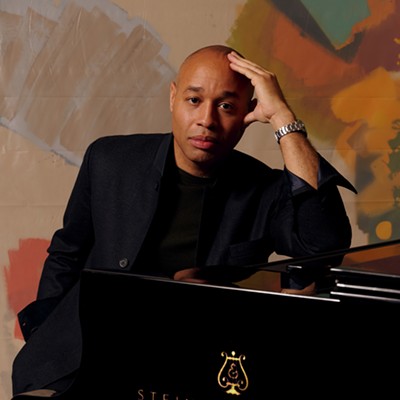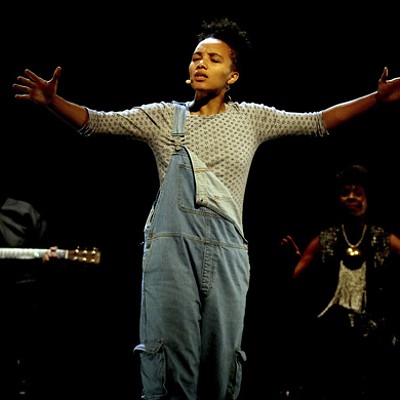Point Park University is on the cusp of transition. Reporting from WESA in late September found that the private Downtown college was in the final phase of a study of consolidating operations with other local universities — though two area institutions have since pulled out of that proposed consortium. Meanwhile, Pittsburgh City Paper's own reporting found some lingering doubts among student leadership about the speed of Chris Brussalis' appointment as permanent president of Point Park. City Paper was also able to reveal early details of Point Park's forthcoming strategic plan, which envisions a swift rise in enrollment, new athletic programs, and more.
That plan, Pioneer Vision 2030, has now been released in full. Long on ambition but shorter on details of implementation, it sets a variety of benchmarks for growth in admissions, institutional giving, and facilities. There are also several notable changes from the draft copy CP originally viewed earlier this fall.
So what's different?
● While the draft plan set a hard target of a 30% admissions increase in the Conservatory of Performing Arts next fall, the final plan now envisions a softer rise of "up to 30 percent." Lou Corsaro, the university's director of public relations, tells CP that Point Park "will not be changing or relaxing admissions standards." However, it remains unclear what exactly will change to allow more students to enroll so quickly.
● There are more details about the First-Year Office, which will "provide support, guidance, and information to [ease] transition into college life." Another initiative with first-years in mind is a revamping of the university's UNIV 101 course, which currently focuses on identifying "a social issue, problem, or opportunity" on campus or in Downtown.
● Point Park is offering and hopes to make permanent a subsidized U-Pass program being "piloted" with Pittsburgh Regional Transit — this would bring the university in line with Carnegie Mellon, Pitt, and other area schools.
● As part of "creat[ing] a sense of student belonging," Point Park plans to expand its intramural sports offerings and create an Office of Intramural and Club Sports. This would be in addition to new varsity programs in men's and women's tennis, wrestling, and lacrosse, the latter of which could begin play in Highmark Stadium next year.
● The university also plans to change its IT ticketing, donor management, and project management systems.
● Goals for donor engagement are pegged to concrete metrics in the final copy.
Perhaps most notably: while the September draft strategic plan contained no mentions of diversity, equity, and inclusion (DEI) programs, the topic is robustly addressed in the final version. The plans for improved or reinforced DEI policies include infusing DEI into the envisioned Institute of Community Engagement, instituting a quota of 10% improvement of faculty and staff diversity, and new training programs, and promoting DEI practices "across all organizational levels."
"We think one of our differentiators is we're probably one of the most diverse campuses in America," Brussalis tells CP. "Those are pillars throughout the plan, but we wanted to add a little more accountability in some of those areas of the plan."
(Sites vary on whether Point Park sits among the nation's most diverse schools. According to its own numbers, a majority of students (67%) are white. Pittsburgh-based city data site Niche places Point Park below Pitt at 41st in the state for diversity and gives it an A- grade in that category. US News places it 207th in the nation among Top Performers on Social Mobility.)
The final plan and earlier drafts align on several key items: admissions will go up, some programs could go away, alumni donations will become a bigger deal, and the university will lean into its athletic programming. As part of becoming a linchpin of Downtown success, Point Park still plans to build or renovate athletic, performance, and rehearsal facilities, as well as mixed-generational housing and a community engagement center.
Brussalis says mixed-generational housing will benefit both residents and the university. He believes single parents, artists in residence, and retirees can benefit from proximity to the conservatory's talents as well as coursework and facilities. The community engagement center would serve these new residents as well as the existing community.
"Those additional people living Downtown need amenities," he says. "Right across the street from that mixed-generational housing, you'll have access to food courts, state-of-the-art recreational facilities, athletic performance space, artistic performance space."
The strategic plan is in large part a blueprint for improving Downtown. Brussalis says the new Institute of Community Engagement would potentially add urban studies and serve as a "learning lab" for improving the city — Brussalis envisions Point Park catalyzing development in a work-from-home world by adding more life to the neighborhood. He notes the university's industry co-op programs and new initiatives such as an on-the-job degree program for future teachers.
"We're here to inspire imagination and creativity in students through experiential learning," Brussalis says. "I think we walk the talk better than most." He explains all of these initiatives, which are supposed to be in place by 2030, are about "advanc[ing] society."
What remains to be seen is how smoothly the university can get from here to there. The plan is aspirational, and new facilities, in particular, could be a reach given the expense and difficulty the university had in opening the Pittsburgh Playhouse. Still, if Point Park pulls it off, success could ease concerns about Brussalis's appointment while providing a boost to the university — and Downtown.



















